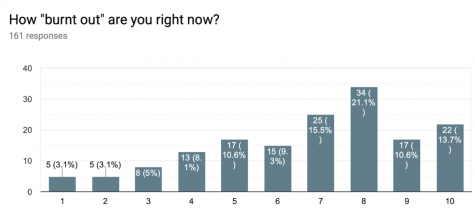Burnout: the rising epidemic among high school students
December 12, 2019
Burnout. A phenomenon, I believe, is all too commonly found in students. It can be marked by persistent feelings of detachment, chronic fatigue, and immense stress. At some point, I would argue almost every single student has felt this way: hopelessly exhausted, worked above and beyond their limits, and stretched paper thin.
As a high school student, there is an ongoing battle to stay engaged and continually care about what you’re doing, especially with work you feel indifferent towards. I think that even when students are passionate about something, it can slowly turn into the same old boring routine that feels overwhelming.

Burnout has become something of a plague in highschools nowadays. Out of 161 Mount Pisgah upper school students that I polled, 81% said they are currently burnt out and 14% of those students said they were completely burnt out.
Many students feel pressured to make the most out of their high school experience or take the hardest classes they can in pursuit of getting into their dream college or earning the best scholarship. Quickly this cycle devolves into a lack of passion and outright complacency in not just school, but life.
To understand what we see as burnout, I think that it’s important to go to where the term was first coined.
In Herbert Freudenberger’s Burnout: How to Beat the Cost of High Success, many people draw the beginnings of the term burnout. He defined burnout as the “state of mental and physical exhaustion caused by one’s professional life.”
Fruedenberger establishes that burnout was more than a nuisance. He asserted it as a real problem. Though he attributes burnout to “professional life,” I think homework, sports, and extracurriculars piled on top of each other can create the same effect for students.
Even the most driven and talented students may face this issue. Which is why I believe the problem is how to beat burnout when you feel it. It’s not a “one size fits all” type of solution, but there are ways to help.
One sophomore responding to my survey said that in order to beat burnout, students “shouldn’t take any honors classes [that they] aren’t ready for.”
Other students suggested to eat better, get more sleep, make weekends longer, or skip homework. A wise senior even said to find solo hobbies students are passionate about to decompress and recharge, like video games, reading, or art.
As I write this article, I can’t help but feel like I should be working on my Spanish project, writing my essay for AP Lang, studying for my math test, or writing my DBQ for history. The stress of all my activities and classes piles up higher and higher until I’m too far behind and burnt out.
At certain points, I overwork myself with activities I don’t even care about. I lose focus on what I find engaging and get lost in the uninteresting, mundane parts of my day. That is my weak point as a student: losing the love in what I’m passionate about.
College counselor Susan Reilly, she said, “we can’t always find what we love to do, but we can always find the love in what we do.” I think those are wise words and great advice because, after all, life is unpredictable and uncomfortable at times.
Maybe it’s time we as students embrace something or someone we love to lighten our load, help us combat feelings of burnout, and help us seek the best in what we are already doing.



